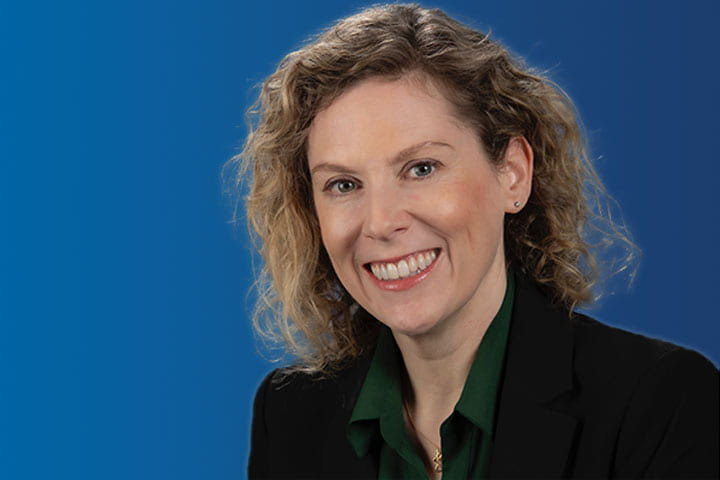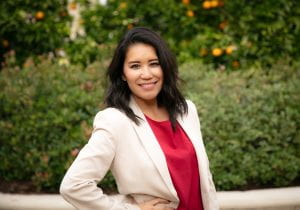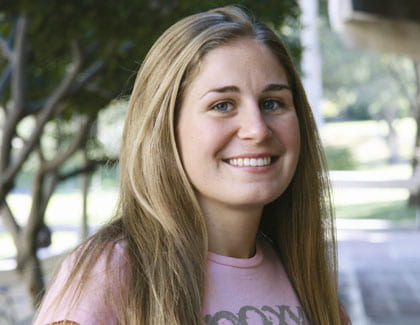Anteater Insider podcast: Navigating barriers to student success
Enrollment management and academic advisors sharing data to advance the student experience


In this episode of the Anteater Insider podcast, the vice provost for enrollment management, Patty Morales, and the director of undergraduate advising for School of Social Ecology, Danielle Primavera, discuss how they collaborate on lifting the student experience to meet students where they are in their academic journey. Insights provided by Enrollment Management Analytics empowers advisors to spend more quality time helping students succeed. Together, they reflect on how their partnership is helping advisors to navigate a successful path to graduation for social ecology students.
The Anteater Insider podcast was recorded in the Antrepreneur Center’s podcast studio. To get the latest episodes delivered automatically, subscribe at:
Apple Podcasts – Google Podcasts – Stitcher – Spotify
Transcript
From the University of California, Irvine, I’m David Naimie, and you’re listening to the Anteater Insider PodCast.Today, I’m speaking with Patty Morales and Danielle Primavera. Patty is the Vice Provost of Enrollment Management. Welcome Patty.
Great to be here.
Danielle is the Director of Social Ecology Undergraduate Advising. Welcome, also.
Thank you, David.
Together, we’re going to discuss how enrollment management and academic advising are partnering together to support student success at UCI. Thank you for joining me, today.
Thanks for having us.
Patty, UCI has a long-standing commitment to student success. What do universities need to do, today, to help students succeed?
It’s a great question. I think that universities really need to understand who their students are to help them succeed. When we’re thinking about student success, I think of images of graduation, getting a job, graduate school – that’s typically what comes to mind. But there’s everything that the student experiences while they’re at their institution, and that’s part of their success story, as well. So, it’s incumbent upon us to deliver that experience that students wished for or imagined when they were in their application process, and I think UCI does a fantastic job of that. It’s evidenced by how many students apply here – 143,000 applicants this past year – that really is a testament to UCI being very intentional, and knowing who our students are, and adapting ourselves so that we can serve them well.
How do you and Danielle interact to help students succeed?
In Enrollment Management, we oversee Admissions, Financial Aid, Registrar, and analytics, which we’ll talk about more. We’re meeting students, even before they become our students, and we’re helping to shepherd them in and make sure they’re well supported financially. The advising part is where we really have to ensure that our students are feeling that they’re realizing their potential, getting out of UCI what they imagined would be here. That’s where the advisors are there to keep watch on that, to engage with the students and to ensure that they know what path is out there for them. They know what resources are there. So, the partnership between my office and academic advising is critical to provide that sort of connective tissue.
Danielle, how is the partnership with enrollment management been valuable for advisors?
It’s been incredibly valuable, David. We, as advisors, take the students once they’re admitted, and as Patty said, we make sure that they’re on track to graduate – that they have a transformative experience. Advisors need to make sure students are on track to graduate, and it’s inevitable that students fall off, sometimes. They may have a hard quarter and their GPA falls below 2.0. Advisors really care that students graduate. We provide intervention early and often to make sure that they’re on track. EMA, the Enrollment Management Analytics tool, has been really helpful in upgrading that process. Prior to EMA, we had a laborious manual process where we would almost literally look at each individual student record to make sure that they were on track. The EMA team has been really great in working with us to create a tool that makes it easy for us to identify students that need intervention early on. That has saved us so much time. Before, it took maybe eight hours. Now, it’s 15 minutes and we’re able to identify students a lot sooner. So that’s been quite a difference.
Danielle, you’re now the director of advising for social ecology. Can you give us an example of a student success story?
Absolutely. I remember one of the students who came in on probation. She was a first-gen student and had lots of familial obligations. She felt like an imposter. She shared with me, “I know that I belong here, I don’t know that I can do it, I’m struggling in my classes.” Many of our students feel this imposter syndrome and that they don’t belong. So, I shared with her, “someone admitted you, it’s not easy to get in here, someone saw that you have the chops to do well, and you did really well in your chem class, you got to an A minus.” Bringing out in her her strength and what she could bring to the table and how her experience is valuable. I think just that little conversation made her feel more confident and realize that she’s not alone and that she can do it. We did talk about adapting her study strategies and time management and connecting her to resources, so that her strengths could be brought out even more and she can do well. After that conversation, quarters later, she did graduate and she shared with me “thank you for that talk and seeing something in me.” I love those student success stories.
That must be satisfying for yourself, but also for the family and the student. We were talking about the consultative service we’re offering to advisors. But the question surfaced, what is it that we do in enrollment management with Navigator that’s actually different?
Yeah, thanks for that, that’s really getting to the heart of the matter. And Danielle just touched on so many important things, the student’s sense of belonging, a student needing that reminder of how much they do have to offer for us as a campus to learn from them, as well as what we can give them, and that feeling that at the end of their journey here of remembering who they are, and how much they have to offer to the world, as well. So again, I’m putting this framing in place, because I know it’s a roundabout way to answer that question. But that’s really what’s at the heart and soul of that you call consultative process, and that’s how we think of it, as well, because we’re thinking not just about sets of data to make available to advisors so that they can do their job more efficiently, as Daniel was describing, and taking something that took maybe hours before to minutes or even seconds. But it’s not just about that. It is about engaging with our campus colleagues about the students, themselves, and remembering their humanity. And remembering that underneath all those numbers and indicators are people’s stories, and the fullness of their experiences in their lives. That is hard to elicit from just sending over a set of reports, right? Sure, Danielle might have in mind what she would do with a certain set of data regarding students who need a course to get back on track or just seeing how they’re doing in terms of their academic progression. But what then? What does that mean for that student and in the conversations that folks in my enrollment management analytics team have with academic advisors and others on campus? That’s where we pull apart those pieces and really start to investigate. The story is here. There’s more than just looking at a set of students and pulling them out and saying, now we have to follow up with them. There’s so much more that we want to learn about them, and in all that information is there the potential for it in our tools? Without those dialogues, in the end, that back and forth, that iterative process, I think we’re really leaving something on the table. I don’t think we’re fully realizing the potential of what’s available to us. We’re not advisors, right? So, if we’re putting together reports, we’re trying to imagine what would be useful, but we need to hear from the advisors. This is great, but here’s what would be even better.
I would love to hear from Danielle an example of how that consultative and iterative process between my team and you, as an advisor, and your colleagues, how that is different from what you’ve experienced in the past, when you had to do the work on your own of finding the individual data elements, running your own kind of analysis. How is it different working with EMA?
It’s been wonderful working with Tony and Jovante on the EMA team. Before this data was out there, it was out in the world, but it wasn’t easily accessible or readily available to us. It was a very manual process. So, it’s been really exciting. I really appreciate that there’s this infrastructure, that the leadership has recognized that this data is really important. And it’s important that it be accessible to us. And now they’re able to create these tools and make them easily available. For example, I asked Jovante to create an IGETC tool. Can you tell me how many students don’t have IGETC? He was able to create that for us. And in a process that took hours, previously – there was a lot we had to manually check – he was able to create that for us. All the advisors have that tool, now. We’re really excited about that. That has saved us a lot of time. Now, we have more time for meaningful appointments and interactions with students.
The comment that you and I shared, Patty, was the goal here is to humanize data, not just to produce tools. Say a bit more on what we were talking about there.
I’ll go back to the comment on applications. Behind all the application data that we have, there are students who are behind each and every one of those 143,000 applications. And what they’re providing us is the richness of their experience. They’re being very vulnerable when they apply, right? We become stewards of all of that. To just render it into sort of flat data and put it into databases, I think the humanity kind of gets drained or abstracted from it. We’re really trying in our engagements with our advising colleagues to bring the student back, sort of emerging from that data again. It starts from a student who ends up as application data. Now, we’re re-animating that data and bringing the student back into focus. I think our ultimate goal is to ensure that it isn’t just data, it’s stories. I’ll leave it at that.
Navigator as you have conceived it, is a consultative service. But I’d like to hear a bit more about your vision for it. This goes back to humanizing data, to actually having a human relationship with data, with our partners on campus, such as Danielle. Could you say more about how you envision, Navigator, what it should be, and how it’s going to help other colleagues on campus?
You said the word, relationship, and I think that’s really what we can distill it into. The concept of a navigator is fundamentally a concept of relationship. If you think of a ship or a plane, there’s a captain, but there’s a navigator, as well. And that navigator has data, they have maps, they have other data informing of conditions and other contextual information. And that navigator is taking all that data. They know what the destination is. They know what the goal of the captain is. What does that captain need to know to get to their destination? And maybe there’s something that the captain isn’t aware of, but the navigator finds out, and they say, “Hey, maybe take this different pathway, or this is even faster, or if you go this way, you might see something even more interesting.” It’s that back and forth, where the captain has to communicate to the navigator over whether or not that’s possible for whatever reasons they have on their side. So, that relationship is at the heart and soul of this. I’m going to pull it back to the student, again. All of us, as staff, faculty, members of the larger community have relationships with these students. Through all of that is really where we find the most creative solutions, or, as Danielle mentioned, where things that were just really surprising and enriching, that if we were just looking at it in a transactional way, we would miss. I think you curtail that larger sense of success.
Danielle, in the use of the Navigator service and the enrollment management analytics tools, has any information come to light that surprised you and how was that information helpful?
Yes, I was preparing for a faculty meeting where I wanted to share our students’ demographics with our faculty. I hadn’t realized that our demographics have evolved, where now 61.3% of our Social Psychology undergraduates are first generation. That’s even more than what the campus has. That’s really grown in the last few years. The faculty were really interested and excited to know that social ecology is playing such an important role in social mobility. They hadn’t known that. Now, they’re thinking how can we better serve our students knowing their demographics? One of our faculty shared this data with his students. The students were surprised, too. I’m really proud that so many students in social ecology are first-gen, and they have that sense of belonging. Many of them feel like, “Oh, I’m not the only one that has these struggles. I’m not alone …many other students are in my same boat, and they’re doing it, I can do it, too.” That’s just shining a light on the data. I’m really excited. To know what else we can do with that data is really exciting.
Student Success is certainly going to continue to be a priority for UCI. Can you foresee, Danielle, any future opportunities that Navigator can assist with, particularly with the students you work with in the Social Ecology?
I think just now we’re able to think creatively in a way that we hadn’t before. It was really hard to get that data before. Now, we can think really creatively. That’s really opened up how to be more efficient, how to have those interventions earlier and more often, how to do the outreach to students, to be more proactive with them. And that has helped to have these more meaningful interactions in conversation. I think it’s just really exciting that we can be creative now. The sky’s the limit.
And I’ll say on our end, that’s really cool and fun for us, too. When the advisors are coming to us and saying, “Could you do this? What if we looked at it this way?” Then, that’s exciting on our end, because maybe we wouldn’t have considered it. There’s just so much out there in the data. It’s the piecing of it together and the new pictures that emerge. That’s kind of an adventure. I’m going to go back to the navigator analogy … it becomes an adventure with data.
It’s good to go on an adventure with a partner, though. Someone who can be on the journey with us.
Patti, Danielle, thank you for speaking with me today.
Thank you, David. This has been great. Thanks for having us.
For more information, you can visit the Office of Enrollment Management website@enrollment.uci.edu. The Anteater Insider Podcast is a production of Strategic Communications and Public Affairs at the University of California Irvine. I’m David Naimie. Thank you for listening.



